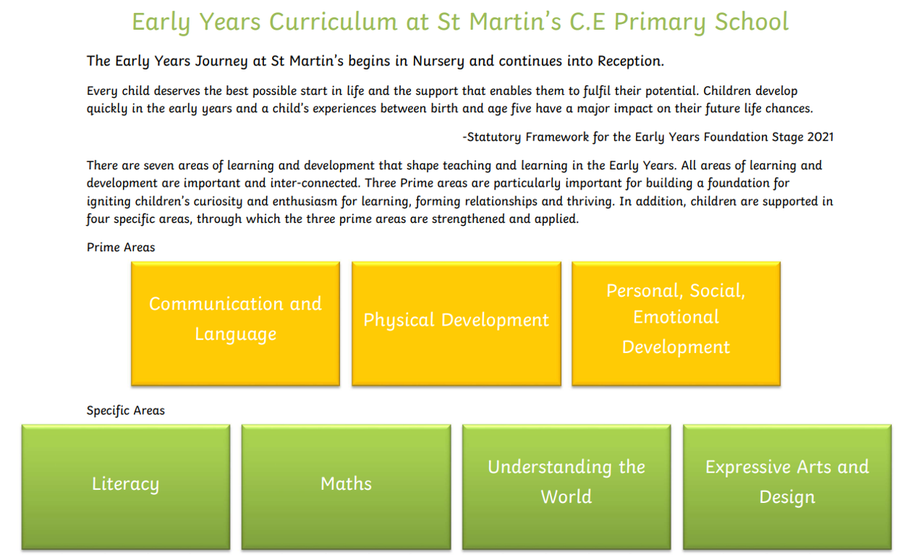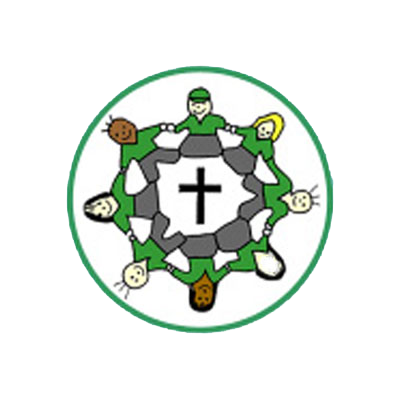EYFS

St Martin’s EYFS Intent, Implementation and Impact Statement
|
Intent |
|
In the EYFS, our curriculum is based around key texts and linked experiences that will engage and inspire our young learners. With our core texts and our wider offer we instil a love of reading and books that will stay with our children throughout their life. The curriculum maps are made up of starting points to spark learning enquiries. Topics were chosen carefully with our children in mind to allow our curriculum to both build cultural capital and underpin learning that will in happen in KS1, KS2 and beyond. Our curriculum aims to enable our children to SHINE. This means they will be:
It is our intent to enable all children to develop characteristics of effective learning which will allow them to become independent, resourceful and resilient learners now and throughout their education. Our learning environment will reflect the individual starting points and needs of all of our children and will provide an engaging and safe learning space where they can thrive. As a school serving a community with high depravation, we ensure a variety of first hand experiences are available to our children throughout their time in the EYFS at St Martin’s to enhance their learning experiences. At the heart of our practice will be strong, trusting relationships between staff and children which instils a sense of belonging in the St Martin’s family. |
|
Implementation |
|
Overarching topics are used to ensure key skills are taught while leaving space for our children to guide their own learning and our planning to be led by the children’s interests. Skills taught build on one another but we understand that learning in the Early Years is not linear and each child’s learning journey is different and unique to them. Quality continuous provision and enhanced provision provide learning environments that allow our children to develop at a pace that is right for them. Children are carefully supported to work towards their individual next steps while they continue on our shared learning journey. Children are provided with opportunities to learn in a range of ways: Child initiated learning During this time it is the adult’s role to follow the child’s lead and interests. Adults support children as a ‘learning mentor’ in their play and they use their knowledge of the children and their developmental next steps to extend their learning. This is done by observing closely what the children are doing and saying, assessing what this tells them about what the child thinks, knows or can do and deciding how best to move the child’s learning on. In child initiated learning, children will access continuous provision. Adults must take care not to ‘hijack’ children’s play or ask too many questions as this can dismiss or interrupt the child’s thinking. Adult initiated learning At this time, the adult will have planned an experience, based on continuous assessments of the children’s learning, but will not stay to lead the activity. It will be expected that the children follow the model they are shown and access the activity in the intended way. However, as the adult does not stay with this activity it is possible that children will take it in a different direction. An adult, in the role of ‘learning mentor’, will from time to time, check on the children. If what the children are doing is not considered valuable learning, the adult will redirect and again provide a model for the children to follow. Adult led learning This happens as a whole class and in small groups. During this time adults have planned outcomes and activities which they direct children towards. The prime areas of Communication and Language; Personal, Social, Emotional Development; and Physical Development which underpin everything we do in Early Years are continuously developed throughout the provision and during adult-led sessions. While phonics teaching follows a synthetic, systematic approach which continues into Year 1 and beyond. Staff within the Early Years team work closely with one another to ensure a consistency in approach, environment and routines. While visuals and gestures are used to support children’s understanding. |
|
Impact |
|
Through implementing the above, our children SHINE: Spiritually and Socially Responsible
High Achievers
Independent
Nurtured
Empowered to meet life’s challenges
EYFS staff have expert knowledge of child development and a good understanding of learning through play. Early Years staff build strong relationships with all children so they feel safe and secure on their learning journey. Strong relationships between staff and children mean assessment is fair and accurate. Teachers use knowledge of the children to inform planning and ensure that all pupils build on current knowledge and skills at a good pace. Judgements are moderated in school and externally with local schools. Click the document below to find out more about our curriculum and assessment. |
